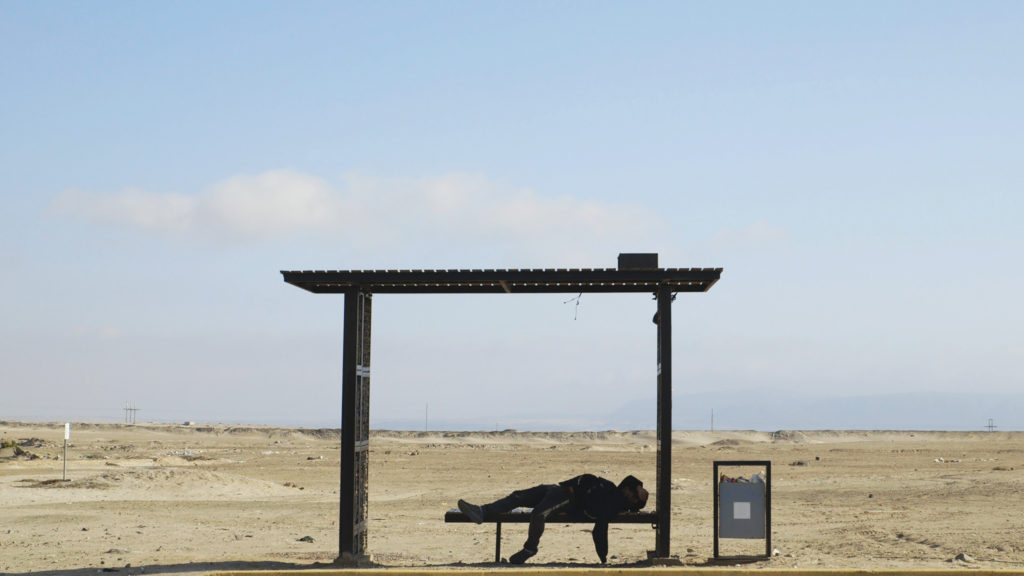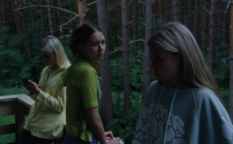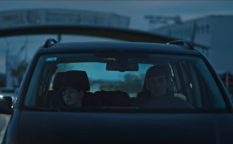Review: Space Journey (2020)

The concept is great. Carlos Araya’s Space Journey (El viaje espacial) is a collection of bus stops throughout Chile shot in frontal fixed frames, from a visual distance, but with impeccable sound as if we were sitting on the bench waiting for our ride. These are places of transition, small public spaces meant to be temporarily shared by strangers who are static as they wait to move on. What a better means to portray a society, especially one defined by displacement in so many ways, in a country where much of the population relies on buses to move inside the widespread capital or between towns and cities that are easily hundreds of kilometers apart? This also makes it a truly photogenic concept, as it reveals the huge diversity of the Chile’s magnificent landscape.
The formal device is effective and accomplished, and keeps the pace and appeal over the film’s concise run-time of barely an hour. Just a few detail shots (hands doing paperwork, smartphone screens, an insufficiently topped-up travel card being scanned…) break the rigid visual form. The first of those exceptions, and the only moment where we come very close to identifiable faces, focuses through bus windows on those who are entering Chile by land, and announces the underlying topic of the film: migration, and especially the recent influx of immigrants.
The main weakness of Space Journey (that won the national competition of Chile’s main documentary festival, FIDOCS, last December, and is having its international première at the Sheffield International Documentary Festival) is precisely the manner in which it tries to interweave that topic, forcing its cinematic concept to convey a discourse with the risk of reducing it to a simple artifice. The problem is that it relies way too much on the spoken word –basically the conversations at bus stops– to express its ideas, and even if they are obviously set up, too many of these dialogues are utterly contrived, both in their elocution and in their wording, which feels too forced to deliver a specific content. They do manage to somehow incorporate what is off screen, but the lack of spontaneity can completely break the spell, just like the heavy-handed structure that concentrates the kind, open, idealised conversations in the first part, and then switches to an accumulation of (alas more realistic) racist views in the second.

An ear that can tell apart different accents in Spanish and also realise when another language is spoken (though this can be reflected in subtitles), will have a much more complete understanding of the “otherness” reflected in the conversations, grasping better whether those who speak are “locals” (and from what segment of the very segmented society), immigrants (and from where), national minorities, tourists, and so on. Of course the reception of any work is influenced by our own background and contextual knowledge, but in this case it might be too determining in the extent to which we can appreciate the sensible discourse that the film proposes around a complex issue.
Carlos Araya was one of the multiple co-directors of the features Propaganda and Dios by MAFI (Mapa fílmico de un país), a fascinating collective of filmmakers documenting events all over Chile. There is an evident influence in the form, with the huge difference that Space Journey is a montage of only one gaze, instead of a collage of diverse voices. That said, although these limitations may downplay the film’s impact, the remarkable image and sound design ensure its quality, and the main ideas and context will anyhow get through: Chile, with its essentially racist and classist society, has been receiving an increasing amount of immigrants over the past years. Haitians in particular are struggling to integrate –or even to survive– despite not speaking Spanish (unlike other Latin Americans such as Peruvians or Venezuelans), and being such conspicuous targets of discrimination in a country where until recently most people had never been in the presence of a black person. At one point, a group of demonstrators passes in front of a bus stop as they march denouncing the “institutional racism” of the Chilean State, and asking for justice for Joane Florvil. The appeal resonates distinctly today, especially knowing that Florvil was a Haitian woman that died after being wrongfully arrested due to the language barrier.
Original title: El viaje espacial
Year: 2019
Runtime: 62’
Countries: Chile
Language: Spanish
Directed by: Carlos Araya
Written by: Carlos Araya and Maria Paz González
Cinematography by: Adolfo Mesías
Editing by: Carlos Araya and Maria Paz González
Sound by: José Manuel Gatica and Roberto Espinoza
Sound editing: Roberto Zúñiga
Produced by: Maria Paz González
Production companies: María una vez
















